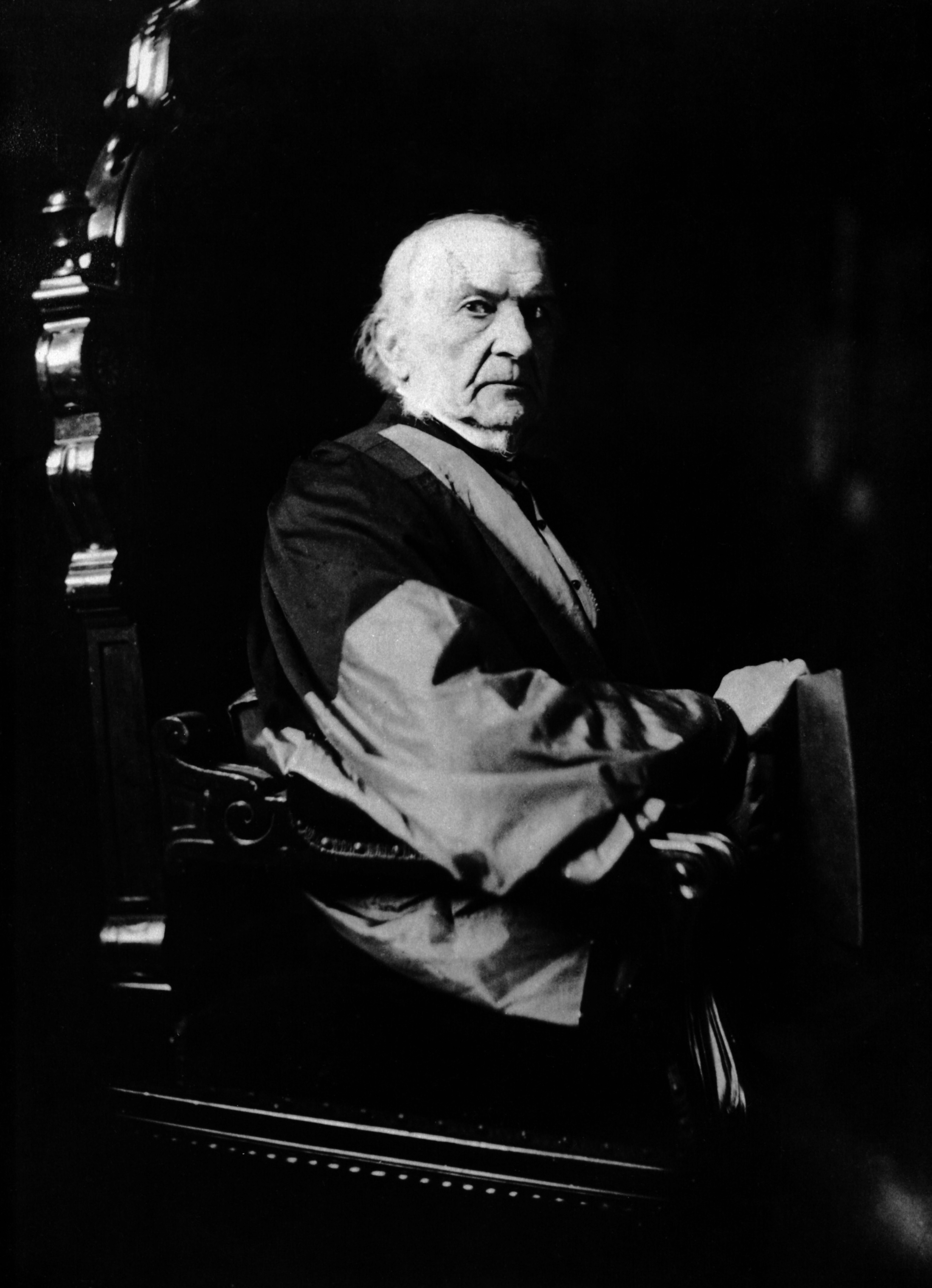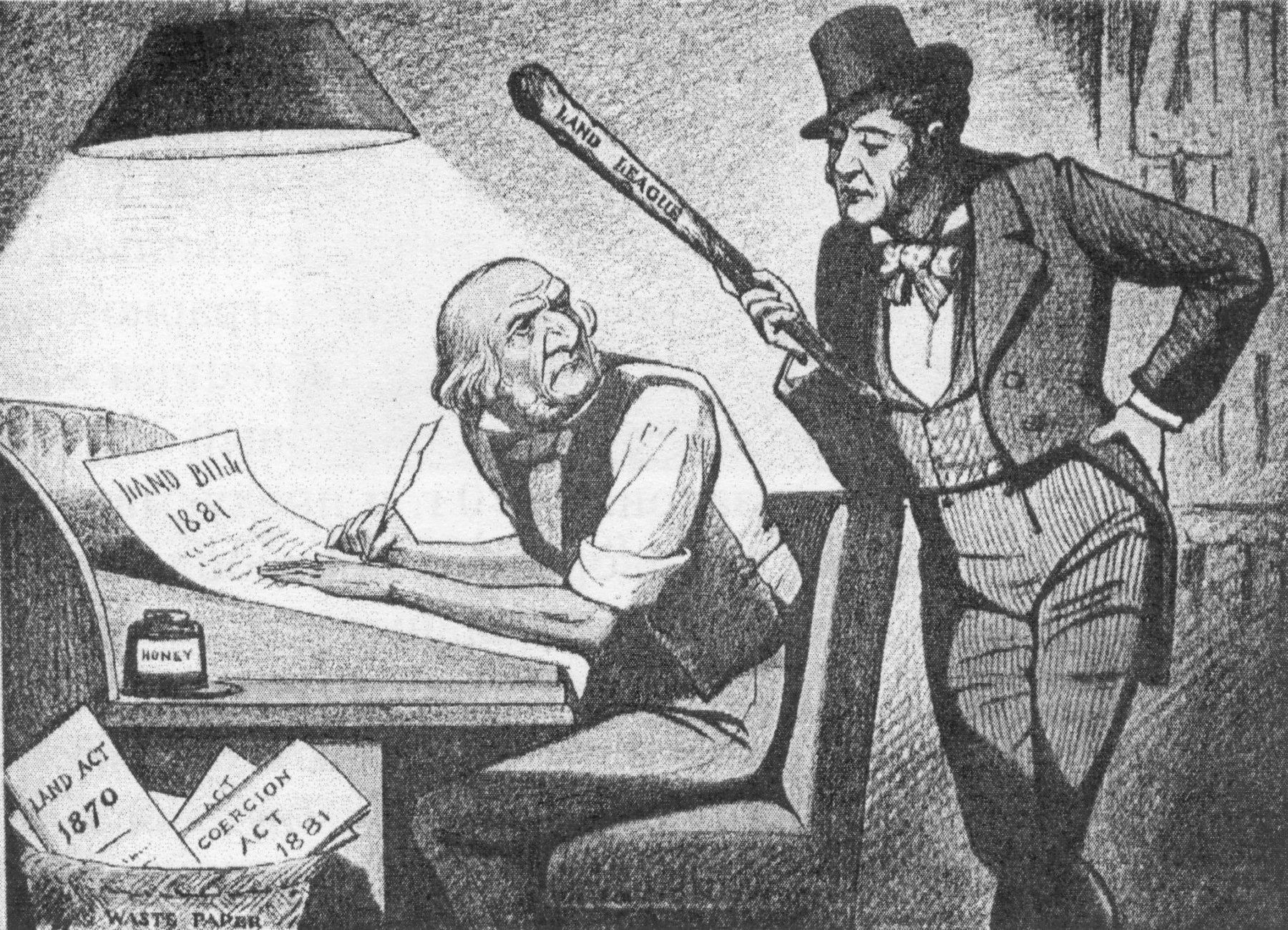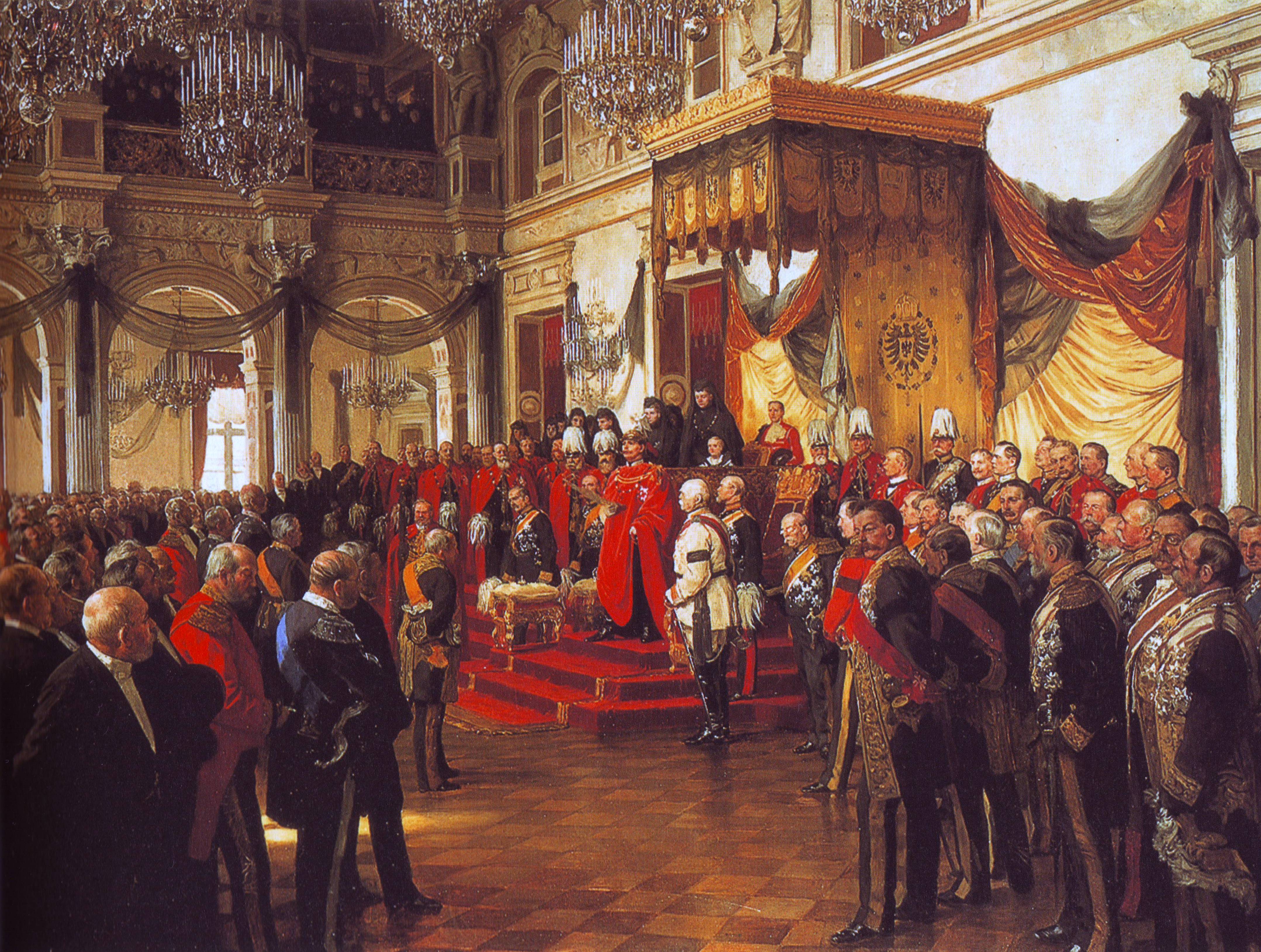|
Protection Of Persons And Property Act 1881
The Protection of Persons and Property (Ireland) Act,The Act had no official short title. It was referred to as ''Protection of Persons and Property (Ireland) Act'', or with ''Person'' in the singular, and/or with ''(Ireland)'' omitted. also called the Coercion Act, was an act of the Parliament of the United Kingdom which allowed for internment without trial of those suspected of involvement in the Land War in Ireland. The provisions could be introduced by proclamation of the Lord Lieutenant of Ireland in any area of the island. Lists of internees had to be laid before Parliament. Enactment The 1881 act was one of more than 100 Coercion Acts applied to Ireland under the Union. W. E. Gladstone was returned to office in 1880, during the agrarian violence and civil disturbance of the Land War in Ireland. William Edward Forster was made Chief Secretary for Ireland. He carried the Compensation for Disturbance Bill through the Commons, only to see it thrown out in the Lords. On 24 ... [...More Info...] [...Related Items...] OR: [Wikipedia] [Google] [Baidu] |
William Ewart Gladstone
William Ewart Gladstone ( ; 29 December 1809 – 19 May 1898) was a British statesman and Liberal politician. In a career lasting over 60 years, he served for 12 years as Prime Minister of the United Kingdom, spread over four non-consecutive terms (the most of any British prime minister) beginning in 1868 and ending in 1894. He also served as Chancellor of the Exchequer four times, serving over 12 years. Gladstone was born in Liverpool to Scottish parents. He first entered the House of Commons in 1832, beginning his political career as a High Tory, a grouping which became the Conservative Party under Robert Peel in 1834. Gladstone served as a minister in both of Peel's governments, and in 1846 joined the breakaway Peelite faction, which eventually merged into the new Liberal Party in 1859. He was chancellor under Lord Aberdeen (1852–1855), Lord Palmerston (1859–1865) and Lord Russell (1865–1866). Gladstone's own political doctrine—which emphasised equalit ... [...More Info...] [...Related Items...] OR: [Wikipedia] [Google] [Baidu] |
Chief Secretary For Ireland
The Chief Secretary for Ireland was a key political office in the British administration in Ireland. Nominally subordinate to the Lord Lieutenant, and officially the "Chief Secretary to the Lord Lieutenant", from the early 19th century until the end of British rule he was effectively the government minister with responsibility for governing Ireland, roughly equivalent to the role of a Secretary of State, such as the similar role of Secretary of State for Scotland. Usually it was the Chief Secretary, rather than the Lord Lieutenant, who sat in the British Cabinet. The Chief Secretary was ''ex officio'' President of the Local Government Board for Ireland from its creation in 1872. British rule over much of Ireland came to an end as the result of the Irish War of Independence, which culminated in the establishment of the Irish Free State. In consequence the office of Chief Secretary was abolished, as well as that of Lord Lieutenant. Executive responsibility within the Iris ... [...More Info...] [...Related Items...] OR: [Wikipedia] [Google] [Baidu] |
Land Law (Ireland) Act 1881
The Land Law (Ireland) Act 1881 (44 & 45 Vict. c. 49) was the second Irish land act passed by the Parliament of the United Kingdom in 1881. Background The Liberal government of William Ewart Gladstone had previously passed the Landlord and Tenant (Ireland) Act 1870 in an attempt to solve the problem of tenant-landlord relations in Ireland. However, the Act was seen to have failed in its purpose. The Home Rule Party had been formed in 1873 and was rapidly turning previously Liberal seats into Home Rule seats. Gladstone visited Ireland in autumn 1877, spending almost a month in County Wicklow and Dublin. Gladstone wrote in his diary that he ensured he visited "farms, cottages & people", including conversing with Irishmen and "turning my small opportunities to account as well as I could". When he had to spend a day in Dublin amongst the English establishment there, he lamented: "...not enough of ''Ireland''". The Liberals were elected in 1880. The Cabinet discussed the Coercion ... [...More Info...] [...Related Items...] OR: [Wikipedia] [Google] [Baidu] |
United Ireland (newspaper)
The Irish National Land League (Irish: ''Conradh na Talún'') was an Irish political organisation of the late 19th century which sought to help poor tenant farmers. Its primary aim was to abolish landlordism in Ireland and enable tenant farmers to own the land they worked on. The period of the Land League's agitation is known as the Land War. Historian R. F. Foster argues that in the countryside the Land League "reinforced the politicization of rural Catholic nationalist Ireland, partly by defining that identity against urbanization, landlordism, Englishness and—implicitly—Protestantism." Foster adds that about a third of the activists were Catholic priests, and Archbishop Thomas Croke was one of its most influential champions. Background Following the founding meeting of the Mayo Tenants Defence Association in Castlebar, County Mayo on 26 October 1878 the demand for ''The Land of Ireland for the people of Ireland'' was reported in the '' Connaught Telegraph'' 2 Novembe ... [...More Info...] [...Related Items...] OR: [Wikipedia] [Google] [Baidu] |
Charles Stewart Parnell
Charles Stewart Parnell (27 June 1846 – 6 October 1891) was an Irish nationalist politician who served as a Member of Parliament (MP) from 1875 to 1891, also acting as Leader of the Home Rule League from 1880 to 1882 and then Leader of the Irish Parliamentary Party from 1882 to 1891. His party held the balance of power in the House of Commons during the Home Rule debates of 1885–1886. Born into a powerful Anglo-Irish Protestant landowning family in County Wicklow, he was a land reform agitator and founder of the Irish National Land League in 1879. He became leader of the Home Rule League, operating independently of the Liberal Party, winning great influence by his balancing of constitutional, radical, and economic issues, and by his skillful use of parliamentary procedure. He was imprisoned in Kilmainham Gaol, Dublin, in 1882, but he was released when he renounced violent extra-Parliamentary action. The same year, he reformed the Home Rule League as the Irish Parliamen ... [...More Info...] [...Related Items...] OR: [Wikipedia] [Google] [Baidu] |
Irish National Land League
The Irish National Land League (Irish: ''Conradh na Talún'') was an Irish political organisation of the late 19th century which sought to help poor tenant farmers. Its primary aim was to abolish landlordism in Ireland and enable tenant farmers to own the land they worked on. The period of the Land League's agitation is known as the Land War. Historian R. F. Foster argues that in the countryside the Land League "reinforced the politicization of rural Catholic nationalist Ireland, partly by defining that identity against urbanization, landlordism, Englishness and—implicitly—Protestantism." Foster adds that about a third of the activists were Catholic priests, and Archbishop Thomas Croke was one of its most influential champions. Background Following the founding meeting of the Mayo Tenants Defence Association in Castlebar, County Mayo on 26 October 1878 the demand for ''The Land of Ireland for the people of Ireland'' was reported in the '' Connaught Telegraph'' 2 November ... [...More Info...] [...Related Items...] OR: [Wikipedia] [Google] [Baidu] |
Queen's Speech
A speech from the throne, or throne speech, is an event in certain monarchies in which the reigning sovereign, or a representative thereof, reads a prepared speech to members of the nation's legislature when a Legislative session, session is opened, outlining the government's agenda and focus for the forthcoming session, or in some cases closed. When a session is opened, the address sets forth the government's priorities with respect to its legislative agenda, for which the cooperation of the legislature is sought. The speech is often accompanied with formal ceremony and is often held annually, although in some places it may occur more or less frequently, whenever a new session of the legislature is opened. Historically, when monarchs exercised personal influence and overall decision-making in government, a speech from the throne would outline the policies and objectives of the monarch; the speech was usually prepared by the monarch's advisers, but the monarch supervised the d ... [...More Info...] [...Related Items...] OR: [Wikipedia] [Google] [Baidu] |
The Spectator
''The Spectator'' is a weekly British magazine on politics, culture, and current affairs. It was first published in July 1828, making it the oldest surviving weekly magazine in the world. It is owned by Frederick Barclay, who also owns ''The Daily Telegraph'' newspaper, via Press Holdings. Its principal subject areas are politics and culture. It is politically conservative. Alongside columns and features on current affairs, the magazine also contains arts pages on books, music, opera, film and TV reviews. Editorship of ''The Spectator'' has often been a step on the ladder to high office in the Conservative Party in the United Kingdom. Past editors include Boris Johnson (1999–2005) and other former cabinet members Ian Gilmour (1954–1959), Iain Macleod (1963–1965), and Nigel Lawson (1966–1970). Since 2009, the magazine's editor has been journalist Fraser Nelson. ''The Spectator Australia'' offers 12 pages on Australian politics and affairs as well as the full UK maga ... [...More Info...] [...Related Items...] OR: [Wikipedia] [Google] [Baidu] |
Cloture
Cloture (, also ), closure or, informally, a guillotine, is a motion or process in parliamentary procedure aimed at bringing debate to a quick end. The cloture procedure originated in the French National Assembly, from which the name is taken. ''Clôture'' is French for "the act of terminating something". It was introduced into the Parliament of the United Kingdom by William Ewart Gladstone to overcome the obstructionism of the Irish Parliamentary Party and was made permanent in 1887. It was subsequently adopted by the United States Senate and other legislatures. The name ''cloture'' remains in the United States; in Commonwealth countries it is usually ''closure'' or, informally, ''guillotine''; in the United Kingdom ''closure'' and ''guillotine'' are distinct motions. Australia In Australia, the procedure by which finite debating times for particular bills are set, or protracted debates are brought to a close, is referred to as a "guillotine" or “gag”. Generally, a minist ... [...More Info...] [...Related Items...] OR: [Wikipedia] [Google] [Baidu] |
Rules Of Order
Parliamentary procedure is the accepted rules, ethics, and customs governing meetings of an assembly or organization. Its object is to allow orderly deliberation upon questions of interest to the organization and thus to arrive at the sense or the will of the majority of the assembly upon these questions. Self-governing organizations follow parliamentary procedure to debate and reach group decisions, usually by vote, with the least possible friction. In the United Kingdom, Canada, Ireland, Australia, New Zealand, South Africa, and other English-speaking countries, parliamentary procedure is often called ''chairmanship'', ''chairing'', the ''law of meetings'', ''procedure at meetings'', the ''conduct of meetings'', or the ''standing orders''. In the United States, it is referred to as ''parliamentary law'', ''parliamentary practice'', ''legislative procedure'', ''rules of order'', or ''Robert's rules of order''. Rules of order consist of rules written by the body itself (often ref ... [...More Info...] [...Related Items...] OR: [Wikipedia] [Google] [Baidu] |
Second Reading
A reading of a bill is a stage of debate on the bill held by a general body of a legislature. In the Westminster system, developed in the United Kingdom, there are generally three readings of a bill as it passes through the stages of becoming, or failing to become, legislation. Some of these readings may be formalities rather than actual debate. The procedure dates back to the centuries before literacy was widespread. Since many members of Parliament were illiterate, the Clerk of Parliament would read aloud a bill to inform members of its contents. By the end of the 16th century, it was practice to have the bill read on three occasions before it was passed. Preliminary reading In the Israeli Knesset, private member bills do not enter the house at first reading. Instead, they are subject to a preliminary reading, where the members introducing the bill present it to the Knesset, followed by a debate on the general outlines of the bill followed by a vote on whether to send it t ... [...More Info...] [...Related Items...] OR: [Wikipedia] [Google] [Baidu] |
Filibuster
A filibuster is a political procedure in which one or more members of a legislative body prolong debate on proposed legislation so as to delay or entirely prevent decision. It is sometimes referred to as "talking a bill to death" or "talking out a bill", and is characterized as a form of obstruction in a legislature or other decision-making body. Etymology The term "filibuster" ultimately derives from the Dutch ("freebooter", a pillaging and plundering adventurer), but the precise history of the word's borrowing into English is obscure.''Oxford English Dictionary'', "filibuster", pp. F:212–213. The ''Oxford English Dictionary'' finds its only known use in early modern English in a 1587 book describing "flibutors" who robbed supply convoys. In the late 18th century, the term was re-borrowed into English from its French form , a form that was used until the mid-19th century. The modern English form "filibuster" was borrowed in the early 1850s from the Spanish (lawless plunder ... [...More Info...] [...Related Items...] OR: [Wikipedia] [Google] [Baidu] |





_Irish_Frankenstein.jpg)



